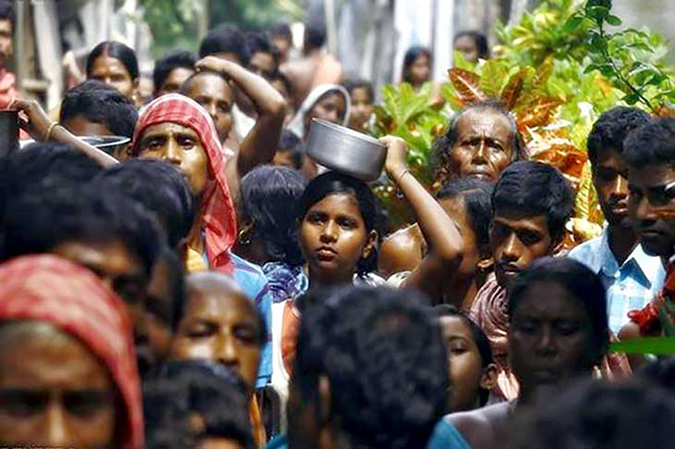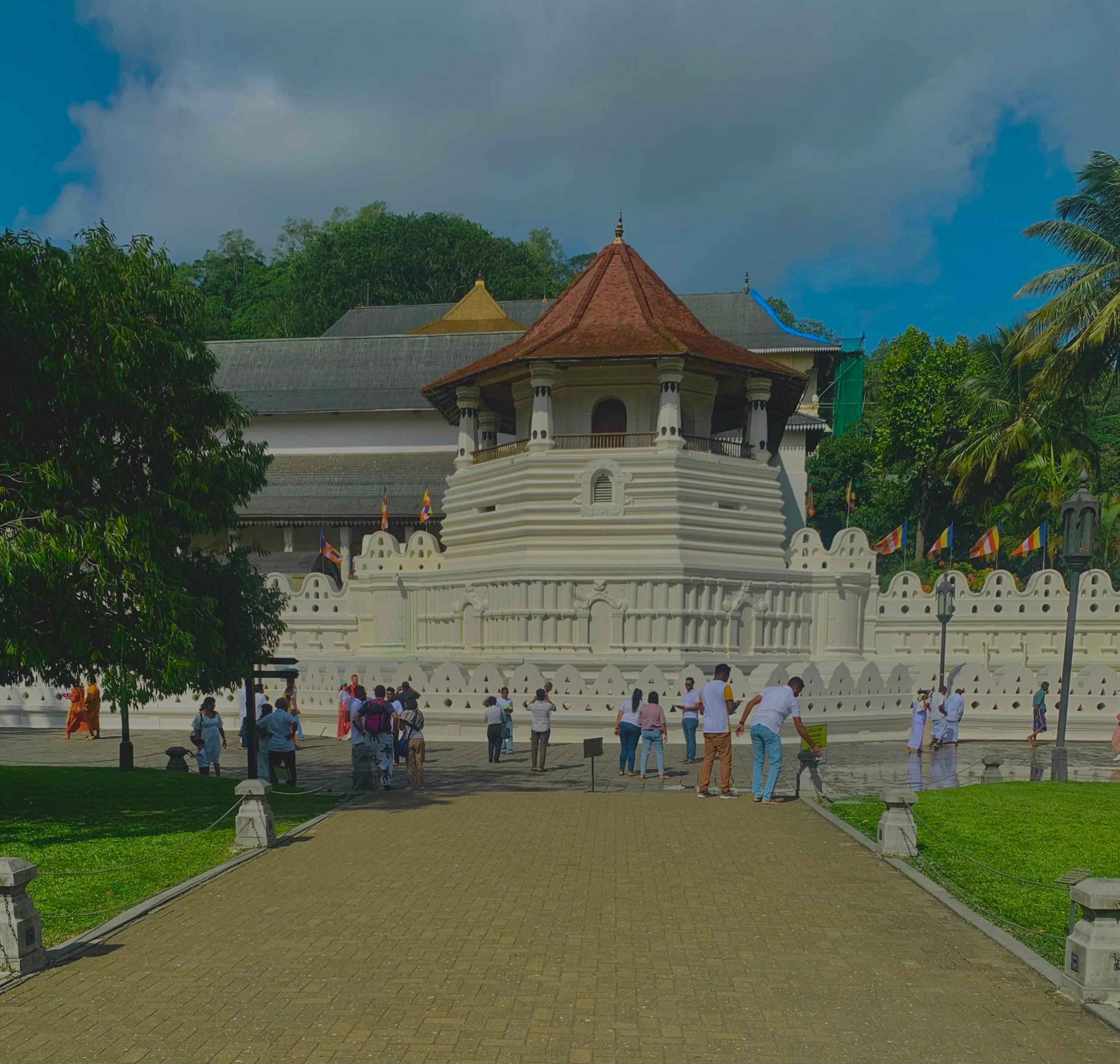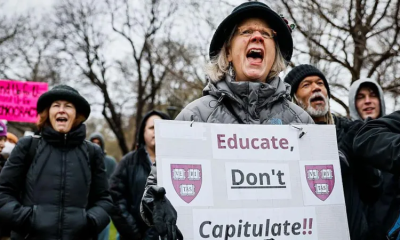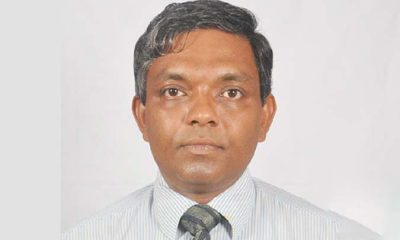News
UNDP report on vulnerability factors handed over to govt.

Debt, a lack of education, and the ability to adapt to disasters are factors that make most Sri Lankans feel vulnerable, says a new report, released yesterday (01 Sept.) by the United Nations Development Programme (UNDP) and the University of Oxford’s Poverty and Human Development Initiative (OPHI).
The Policy Report, titled ‘Understanding Multidimensional Vulnerabilities: Impact on People of Sri Lanka’ puts forth Sri Lanka’s first ever Multidimensional Vulnerability Index (MVI), which was derived using the National Citizen Survey (NCS) 2022-23 covering a representative sample of 25,000 households. The survey was conducted between November 2022 and March 2023 to capture the impact of the cascading crises on the people.
It demonstrates the overlapping challenges faced by Sri Lanka’s population and weaves together a novel set of indicators to capture vulnerabilities beyond traditional income-based measures.
The index includes 12 indicators, grouped under three dimensions: education, health and disasters, and living standards. Indicator selection was based on consultations with key stakeholders, including a technical advisory panel. The collaborative engagement process ensured that the MVI would appropriately reflect the complexity of vulnerabilities experienced by individuals and groups across Sri Lanka.
The national results of the MVI indicate that the key factors that impact vulnerability include household indebtedness, largely due to pawning items to purchase essential goods; years of schooling, disaggregated by gender; and adaptive capacity to disasters. In addition to these, working in informal jobs also makes individuals more vulnerable.
Commenting on the report, PM Dinesh Gunawardena said that it comes at a crucial time for Sri Lanka. “Given recent events, it is timely that the first Multidimensional Vulnerability Index (MVI) is developed for Sri Lanka, to ensure that those at the helm of policymaking will continue to be equipped with the information they need to determine where help is most needed.
“Therefore, I thank the team that has worked on this report and in developing the National Citizen Survey and the MVI for taking the initiative to do so, and I encourage all decision-makers, in the relevant Government institutions, as well as the private sector and civil society, to use this analysis to first understand and then implement measures to help move Sri Lanka away from vulnerability in the future.”
Dr. Sabina Alkire, Director, Oxford Poverty and Human Development Initiative (OPHI), University of Oxford, observed: “The MVI sheds light on the complex landscape of vulnerability in Sri Lanka, where 55.7 percent of the population, or 12.3 million people, experience multidimensionally vulnerability. Focused interventions, such as reducing indebtedness or enhancing disaster preparedness, are vital to build resilience. This exploratory MVI expands on Sri Lanka’s official Multidimensional Poverty Index by using 2022/23 citizen survey data and including a distinct tapestry of vulnerabilities.”
Highlighting the importance of the report, Ms. Azusa Kubota, UNDP Sri Lanka Resident Representative, said: “Amidst a rapidly shrinking fiscal space, deepening the understanding of these diverse experiences and vulnerabilities is an important first step towards designing impactful policy and programme interventions. The report’s findings have far reaching policy and programme implications as Sri Lanka embarks on a series of interventions to ensure sustainable, inclusive and green recovery pathways from the crises. We hope this report will influence and shape policies and interventions that prioritize the needs of vulnerable communities.”
Several districts, including Puttalam, Batticaloa, Mullaitivu, Kilinochchi, Ampara, Vavuniya, and Nuwara Eliya, exhibit multidimensional vulnerability, highlighting the need for focused interventions to address factors, like disaster preparedness, debt relief, water source accessibility, and female education. Thus, a nuanced, well-designed and comprehensive policy approach is recommended to improve the wellbeing of these communities.
The MVI sheds light on the complexity of existing vulnerabilities – with overall results suggesting targeted efforts in areas like debt, disaster preparedness, water source accessibility, and female education, emphasizing the need for multisectoral engagement to enhance the well-being of vulnerable communities in Sri Lanka. Ensuring that such data is up-to-date and comprehensive is a crucial first step in addressing these challenges and maintaining progress towards a more equal world.
The MVI for Sri Lanka is identified as the first ever vulnerability index using Citizen Science. However, this study is not without its limitations. The report acknowledges this and advocates for the inclusion of further criteria and inclusion of the MVI as part of National Data collection exercises.
The NCS was initiated by UNDP Sri Lanka, in collaboration with the Citra Innovation Lab and UNDP’s SURGE Data Hub, to capture a snapshot of vulnerabilities experienced by Sri Lankans as a result of the pandemic and the economic crisis.
News
We aspire to build a nation where all citizens coexist in peace and resilience for the future generation -PM

Prime Minister Dr. Harini Amarasuriya stated that the government is ready to listen to the people and aspire to ensure a peaceful and united nation for future generations.
The Prime Minister made these remarks while addressing public gatherings on April 20 at the Manik Farm Community Development Centre in Settikulam and the Ukkulankulam Ground in the Vanni electoral district.
The current Parliament has the highest number of female representation in its history. Previously, women constituted less than 5% of Parliament out of the total number of 225 However, 52% of the country’s population are women.
Women play a significant role in sustaining the economy, maintaining family structures, and upholding society yet their representation in decision-making bodies has been limited. Therefore, we urge you to elect not only male representation to Parliament but also more female representatives from the Vanni district.
Vavuniya is currently developing into a thriving city. Therefore, essential services expected from provincial councils must be effectively delivered. Local government bodies should actively participate in the development of the rural sector.
We recognize that education holds significant value for the people of the North. You place great importance on education. However, the country’s education system has deteriorated and weakened. Specifically, the lack of necessary attention to the education sector in the North has made it more challenging compared to other regions. Moreover, I have learned of a more alarming issue that the diminishing value placed on education by young men and women. Clandestine Drug Distribution and alcohol are now readily visible in everywhere. There are no avenues for youth to find joy while avoiding these substances. The underdevelopment of fields such as science, arts, and drama has left them without means to find happiness. Therefore, significant interventions must be necessary.
If you elect a group that is free from corruption and fraud, we can allocate funds without hesitation, ensuring they reach the appropriate hands. These funds can then be directed towards the development of your village. That is why your choice is important.
The events were attended by Deputy Minister of Co-operative Development, Upali Samarasinghe, Vavuniya District MPs S. Thileepan and M. Jegatheeswaran, along with the local government candidates and residents.
[Prime Minister’s Media Division]
Latest News
Exposition of sacred tooth relic extended by an hour –

The Sri Dalada Maligawa has announced that due to the large number of devotees coming to Kandy to venerate the sacred tooth relic, the time of exposition of the sacred tooth relic has been extended by an hour.
Accordingly the public can pay homage from 11.30am upto 05.30pm from today [21]

News
Pope Francis has died at the age of 88, Vatican says

Pope Francis has died at the age of 88, the Vatican has announced.
His Eminence, Cardinal Farrell, announced with sorrow the death of Pope Francis, with these words: “Dearest brothers and sisters, with deep sorrow I must announce the death of our Holy Father Francis. At 7:35 this morning (local time), the Bishop of Rome, Francis, returned to the house of the Father. His entire life was dedicated to the service of the Lord and His Church.” “He taught us to live the values of the Gospel with fidelity, courage and universal love, especially in favour of the poorest and most marginalised.”
Farrell adds: “With immense gratitude for his example as a true disciple of the Lord Jesus, we commend the soul of Pope Francis to the infinite merciful love of the One and Triune God.”
Francis’s papacy heralded many firsts and while he never stopped introducing reforms to the Catholic Church, he remained popular among traditionalists.
He was the first Pope from the Americas or the southern hemisphere. Not since Syrian-born Gregory III died in 741 had there been a non-European Bishop of Rome.
He was also the first Jesuit to be elected to the throne of St Peter – Jesuits were historically looked on with suspicion by Rome.
Francis’s predecessor, Benedict XVI, was the first Pope to retire voluntarily in almost 600 years and for almost a decade the Vatican Gardens hosted two popes.
As Cardinal Bergoglio of Argentina, he was already in his seventies when he became Pope in 2013.
[BBC]
-

 Business3 days ago
Business3 days agoDIMO pioneers major fleet expansion with Tata SIGNA Prime Movers for ILM
-

 Features5 days ago
Features5 days agoNipping the two leaves and the bud
-

 News2 days ago
News2 days agoFamily discovers rare species thought to be extinct for over a century in home garden
-

 Features5 days ago
Features5 days agoAvurudu celebrations … galore
-

 Features4 days ago
Features4 days agoProf. Lal Tennekoon: An illustrious but utterly unpretentious and much -loved academic
-

 Foreign News2 days ago
Foreign News2 days agoChina races robots against humans in Beijing half marathon
-

 Latest News7 days ago
Latest News7 days agoTrump freezes $2bn in Harvard funding after university rejects demands
-

 News5 days ago
News5 days agoCounsel for Pilleyan alleges govt. bid to force confession
























